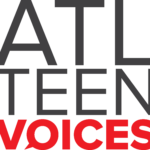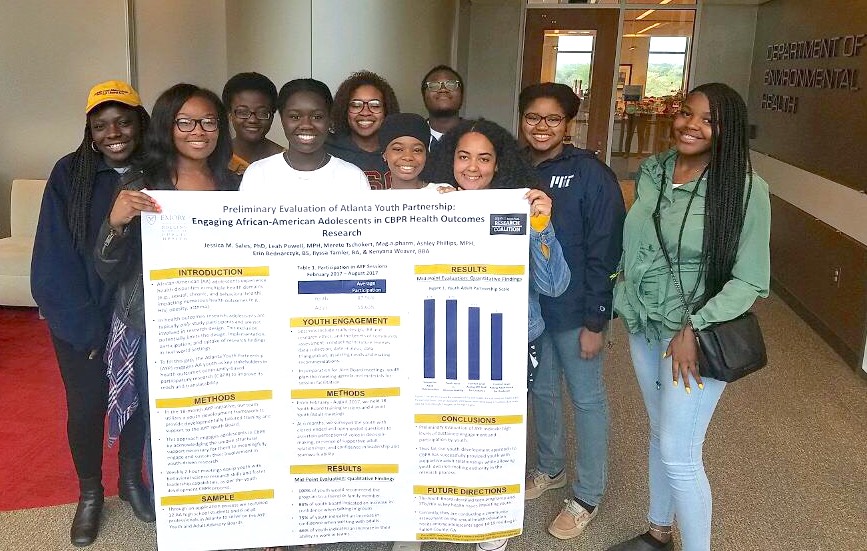Did you know that teens in Fulton County experience the highest rates of sexually transmitted diseases than teens in other metro-Atlanta areas?
In Georgia, especially Fulton County, the quality of sexual health education is severely lacking. The Atlanta Youth Research Coalition (AYRC) — a group of 12 teens from metro Atlanta working with public health leaders at Emory University Rollins School of Public Health — conducted research last spring and found that systemic sexual health education — sex ed — improvements are needed for metro-Atlanta teens. According to our research, Fulton County has the highest rates of unintended pregnancy, HIV, and other STIs among adolescents in Georgia.
Sexual health education is a key component of overall health education; therefore, it must be discussed, especially for teens who are just growing into their bodies and discovering new things about themselves. The future health of teens is in jeopardy.
When we first came together in February 2017, we discussed the possibility of researching a multitude of topics besides sexual health, such as obesity, healthy food availability, mental health, etc. When we eventually voted, we decided to research the sexual health of metro Atlanta. Most of us were able to identify a person in our lives suffering the impact of a lack of sexual health education. Others were aware of the negative effects of having an insufficient sexual health education. As teens ourselves, we were able to relate to the stigma surrounding sex, sexual health, and sexual health education. Very few of us were able to attest to having an adequate sex ed.
We wanted to hear from teens
We set out to investigate the condition of sexual health education in Fulton County, specifically, and to do so we needed to conduct a community needs assessment. A community needs assessment can be defined as a gathering of information to discover the needs and assets of an area. First, we looked at HIV/AIDS and other STD rates, and teen pregnancy rates of various counties in the metro-Atlanta area versus Georgia as a whole, and Fulton County had the highest rates of unintended pregnancy, HIV, and other STIs among adolescents.
After looking into some literature regarding sexual health, we started working on questions for our survey. We knew the survey would be our most basic way of collecting data for our study, and we could send a lot of them out. We asked 15 questions, such as if they’ve had sex ed before, was it helpful, the topics covered in their sex ed, when they had sex ed, who they go to for their sex ed questions, if there are enough health resources in their community, etc. We sent the survey through social media and in person at Atlanta Public Schools located in Fulton County, and 113 people took the survey.
We also conducted two focus groups with Fulton County students. One was held at Emory University and consisted of high school students that resided in Fulton County, while the other was held at the @Promise Center, a center opened by the Atlanta Police Foundation on Atlanta’s West side.
From these focus groups, we learned that students:
- place a high importance on protection from STDs and unwanted teen pregnancies;
- were not educated well regarding puberty and the spread of HIV;
- truly do want to see improvement in the sex ed classes, and
- want their parents to initiate the awkward but important conversations about sexual health.
The students also gave suggestions on how sex ed could be improved to better benefit them — such as learning from a peer educator, eliminating the stigma that surrounds sex ed, etc., since many students already acknowledged the fact that their sex ed teachers’ delivery was poor and some of the information given was actually incorrect.
Interviewing adult experts
Another method of getting data for our research was conducting seven interviews with key informants in the sexual health field, including a state representative, an adolescent physician, an epidemiologist (someone who studies the incidence and possible control of diseases), a program director at Georgia Equality, and many more.
Every single informant advocated for a comprehensive sex ed curriculum in Georgia so students can be properly educated and be safe in the future. A few informants encouraged students and parents to actively advocate for themselves to the teachers, schools, school boards and districts for the sexual health education curriculum they want.
One of our key informants — Andrea Swartzendruber, Ph.D, a professor at the University of Georgia’s College of Public Health who also served as theAYRC’s researcher — said there is a lack of specificity on what sex ed should include, and really even the approach: “There’s nothing in our state law that says it has to be accurate. There’s nothing in our state law that says you need to provide comprehensive information about any topic, and it could be biased, it could be inaccurate, and that’s really unfortunate.”
Many other key informants also highlighted that there is nothing in Georgia’s state laws that prevents comprehensive sexual health curricula from being taught.
After analyzing all the data we collected, our team came up with seven main themes regarding Fulton County’s sex ed curriculum, which are: content gaps, desired improvements, the quality of sex ed, how sex ed can be stigmatizing, the value students place on sex ed, how students perceive the risk of sexual health illnesses, and where students get educated regarding their sexual health.
Our recommendations
Our group also came up with recommendations to address these needs:
- comprehensive, medically-accurate, inclusive sexual health education
- more information about community resources and greater accessibility to resources
- more school-based education about sexual health
- trained educators that follow systematic, comprehensive, and accurate curriculum with fidelity
- sex-ed earlier in the academic career and over a longer period of time
- greater parental involvement in the learning process
- someone to teach sex-ed that has also been in the student’s position or can relate to them
- making sexual health education mandatory
- include awareness and exposure to the rates of sexual health concerns in the community
- sexual health education should be less stigmatizing, use a more normalized approach to talking about sex-ed.
In our final report, we wrote: “Adopting these strategies would greatly benefit students and could lead schools in Fulton [County] to be leaders in sexual health education in Georgia.”
Sharing our findings

We shared our findings through a final report and presentation, by participating in the upcoming VICELAND television series “Slutever,” and on a youth panel at Children’s Healthcare of Atlanta Adolescent Medicine Symposium held Oct. 13.
We were really excited to participate in the CHOA panel, because it was a chance to present our findings to a community of adults and medical professionals who would be prepared to listen to a group of adolescents, the group of people they do their best to serve at their jobs. We tried to drive home the point of the seven themes we discovered from our community needs assessment and how Georgia will not be able to truly support its young people without changing the sex ed curriculum to a more comprehensive one.
We were really proud to be a part of the panel and be commended by everyone in the room after the amount of work we put into the project. It was also amazing to see how engaged the audience was because they asked us a lot of questions and genuinely seemed like they wanted to know the ins and outs of our research.
The entire journey of this community needs assessment was an eye-opener. It made us realize the importance of advocating for a more comprehensive sex education curriculum in Georgia, and of advocating for the health — both mental and physical — of young people.
Georgia has some of the country’s highest rates of STDS, HIV and AIDS, and teen pregnancy. We have no option but to do better, and that starts with actually educating our teens. Everyone’s sexual health journey will look different, which we have to respect, and withholding information and resources that could keep someone healthy is wrong by all means — no matter what you believe.
A couple other lessons learned from AYRC members* include:
Aaron Johnson, 18, Emory University: I learned that most youth actually want improvements to their sex ed.
Ann-Marie Abunyewa, 16, Wheeler High School: I learned that Georgia has very lenient laws on what type of sex ed curriculum schools can offer to their students, including the fact that there is not an emphasis on teaching accurate information about sexual health.
Derin Aladesanmi, 16, Wheeler High School: From the AYRC community needs assessment, I learned that sexual health education is extremely neglected in Georgia which has negatively affected students to the point where they do not know basic anatomy or how to protect themselves, sexually or emotionally. Seeing as I live in Cobb County, which uses the abstinence-based Choosing the Best curriculum, I probably have had a very similar experience as many Fulton County students.
Elissa Gibson, 18, Massachusetts Institute of Technology – Participating in this research exposed me to new medical fields and public health issues. I have a better understanding of the implementation of a community needs assessment, and this project strengthened my passion for learning and helping others. I plan to participate in research involving technology and the wellness of a person, using the skills that I acquired from this project.
Yvrine Nguiwenga-Nketcha, 17, Forest Park High School: I learned that current sex ed classes are missing important subjects that are vital to the decisions our youth will make in the future regarding their health. Parents and kids have recognized this issue and want changes made.
A side note about sex ed:
Leah Powell, Public Health Program Associate at Emory’s Rollins School of Public Health: Sexual health education is not federally required to be taught in schools. However, most states participate in some form of public school-based sex and HIV education. In Georgia, sex and HIV education is mandated, but instruction is not required to be medically accurate, unbiased, age- or culturally appropriate, or devoid of religious pretenses. Sex ed in Georgia does require HIV education and stressing abstinence. It does not require information on sexual orientation, coercion and consent, condoms and other forms of contraception, or healthy relationships.
Derin, 16, and Elissa, 18, served as youth board members on the Atlanta Youth Research Coalition at Emory University, Rollins School of Public Health.
* Schools listed are current schools for these participants, not necessarily the schools they attended while conducting the research last school year.
 Partner with VOX to share your story
Partner with VOX to share your story
Organizations and schools serving teens can partner with us to share your work and teens’ original content. Contact Rachel@voxatl.org or click here for more information.




